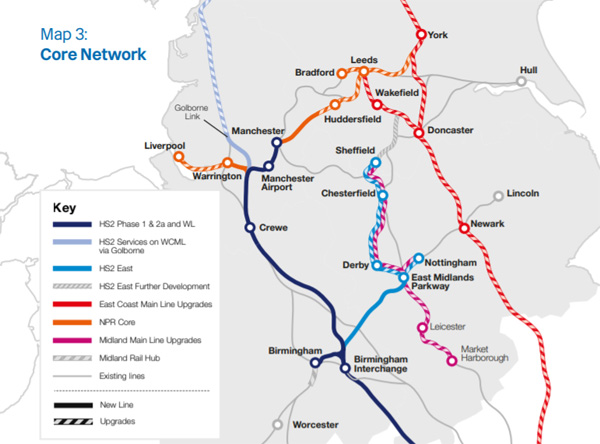Politicians and transport sector leaders have questioned the Government’s commitment to its ‘levelling up’ agenda in reaction to last week’s Integrated Rail Plan, which saw Northern ambitions dashed.
The announcement that the Eastern Leg of HS2 will largely be scrapped, ending in the East Midlands rather than Leeds, and the Northern Powerhouse Rail (NPR) plans will be scaled back, rocked the transport sector.
Industry leaders, as well as regional politicians, complained about the cutbacks and lack of ambition in the plan.
Director of external affairs for the Civil Engineering Contractors Association (CECA) Marie-Claude Hemming said: 'It is a missed opportunity that the Government has failed to grasp the transformational potential of the full HS2 Eastern Leg and Northern Powerhouse Rail plans.

DfT's revised plans for the North. Photo: Department for Transport's Integrated Rail Plan
'One key section of Northern Powerhouse Rail alone could deliver a £22bn boost to the Northern economy by 2060 – nearly £8bn more than previously forecast – according to a new report from global engineering consultancy Mott MacDonald.'
She pointed out that a new high-speed rail link between Leeds, Bradford and Manchester could potentially increase productivity by 6% (equivalent to £16.5bn), raise the employment rate by 1.5% (equivalent to £5.5bn), and increase gross value added (GVA) in the North by about 8% over 10 years.
'The Government’s levelling-up agenda must include a step-change in infrastructure delivery in the north of England,' she added.
Mark Southwell, managing director, civil infrastructure, UK & Ireland at AECOM, wlecomed the investment but said the decision to cutback schemes was 'a lost opportunity for the communities the lines would serve, as well as the rail industry which was geared up to deliver'.
'Decarbonisation of our transport network and levelling up are two of the biggest challenges of our time and investment in a high-speed rail network will pay dividends for decades to come.'
Louise Gittins, interim chair of sub-national transport body Transport for the North (TfN) which had previously been a co-client on NPR, described the announcement as ‘woefully inadequate’.
She said: ‘Leaders from across the North and from across the party political divide came together to ask for a network that would upgrade the North for this century and in line with the rest of the country.
'Our statutory advice asked for an over £40bn network but the Government has decided to provide even less than half of that. It’s time for real evidence of levelling up.'
TfN’s ambitions for NPR had included a new transpennine line that linked Manchester to Leeds through a new station at Bradford but the Government’s proposals concentrated on upgrades to the existing route.
Bradford Council leader Cllr Susan Hinchcliffe said ministers had ‘missed a golden opportunity to make an investment which would have repaid itself many times over’.
She said: ‘It’s wrong-headed economics for the North and for the country not to connect Bradford so we will fight on.
‘This blow will not dent our ambition. We will not let our people down, and we absolutely will not rest in making sure everyone in Bradford has just as good life chances as those people in the Tory heartlands of Surrey.’
James Lewis, leader of Leeds City Council, said the city had been ‘left extremely disappointed’ but not surprised by the announcement.
He added: ‘This is not the first time our city has been promised major infrastructure investment, only for it to be curtailed or cancelled. It is 10 years this month since the Transpennine Route upgrade was announced, yet we are still waiting for the fully-defined scheme, and it is 30 years since the idea of a supertram was first mentioned.’
However, Ben Bradley, leader of Nottinghamshire CC and Conservative MP for Mansfield, described the announcement as 'a game-changer from a levelling up point of view’.
He said: ‘The announcement is really positive. It connects our cities Nottingham and Derby to Birmingham with high speed rail, which is great. It draws all those areas into a commutable distance for jobs, which will be economically very beneficial. It ticks our boxes from a Nottinghamshire perspective because it commits to a station at Toton (in Nottinghamshire), which has been our big priority in terms of job creation and levelling up.
‘For us as a region the message is that we have a plan, and we’ll be able to shape what levelling up is for our area, not just wait and see what other people tell us it is. This is certainly a good step in the right direction.’
Paul Tuohy, chief executive of Campaign for Better Transport, said there was ‘much to welcome in the Integrated Rail Plan. However, it is vital that abysmally-connected Bradford is not left behind - the city needs and deserves much better-integrated and faster rail connections to both Leeds and Manchester as a matter of priority.’
Andy Bagnall, director general of the Rail Delivery Group, said: ‘Rail has a vital role to play in driving the new economy and the fair, clean recovery the country wants to see.
‘While millions of people will benefit from this major investment in boosting connectivity between major cities in the North of England and the Midlands, leaving out key pieces of the jigsaw will inevitably hold back the ability for the railways to power the levelling up agenda and the drive to net zero.’
Register now for full access
Register just once to get unrestricted, real-time coverage of the issues and challenges facing UK transport and highways engineers.
Full website content includes the latest news, exclusive commentary from leading industry figures and detailed topical analysis of the highways, transportation, environment and place-shaping sectors.
Use the link below to register your details for full, free access.
Already a registered? Login